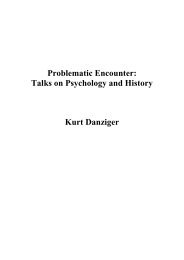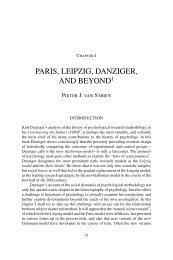The positivist repudiation of Wundt - Kurt Danziger
The positivist repudiation of Wundt - Kurt Danziger
The positivist repudiation of Wundt - Kurt Danziger
Create successful ePaper yourself
Turn your PDF publications into a flip-book with our unique Google optimized e-Paper software.
228 KURT DANZIGER<br />
23. <strong>Wundt</strong>, “Ober die Definition der Psychologie.” Also Wilhelm <strong>Wundt</strong>, “Ober naiven und kritischen<br />
Realismus,” Philosophische Studien 12 (1895-1896): 307-408; 13 (1897-1898): 1-105, 323-433. It should be<br />
noted that although <strong>Wundt</strong> frequently criticized views to which he was pr<strong>of</strong>oundly opposed, he generally<br />
maintained courteous and at times friendly relationships with the authors <strong>of</strong> these views. See Wolfgang G.<br />
Bringmann, William D. G. Balance, and Rand B. Evans, “Wilhelm <strong>Wundt</strong> 1832-1920: A Brief Biographical<br />
Sketch,” Journal <strong>of</strong> the History <strong>of</strong> the Behavioral Sciences 11 (1975): 287-297.<br />
24. <strong>Wundt</strong>, “Ober naiven und kritischen Realismus,” 1897-1898, p. 410.<br />
25. <strong>Wundt</strong>, “Ober die Definition der Psychologie,” p. 34.<br />
26. Ibid., p. 15.<br />
27. Ibid., p. 33.<br />
28. In terms <strong>of</strong> his general prescription, Mach recognized the practical need for introspection, “although<br />
my ideal <strong>of</strong> psychology is that it should be purely physiological” (Mach, Sensations, p. 340).<br />
29. Wilhelm <strong>Wundt</strong>, “8ber die Eintheilung der Wissenschaften,” Philosophische Studien 5 (1888-1889):<br />
1-55.<br />
30. Wilhelm <strong>Wundt</strong>, Die physikalischen Axiome und ihre Beziehungen zum Causalprincip (Erlangen:<br />
Enke, 1866).<br />
31. In this respect <strong>Wundt</strong>’s position is closer to certain modern approaches, for example, Edwin A. Burtt,<br />
<strong>The</strong> Metaphysical Foundation <strong>of</strong> Modern Science (London: Routledge and Kegan Paul, 1925; Herbert<br />
Butterfield, <strong>The</strong> Origins <strong>of</strong> Modern Science 1300-1800 (London: Bell, 1957); Alexander Koyrt, Newtonian<br />
Studies (Chicago: University <strong>of</strong> Chicago Press, 1968). <strong>Wundt</strong>’s emphasis on the fact that natural science<br />
is only possible by virtue <strong>of</strong> a prior abstraction from the immediate experience <strong>of</strong> the human observer<br />
sometimes receives extreme expression in the assertion that his psychology is much closer to being a strictly<br />
empirical discipline than the natural sciences which “everywhere require the assistance <strong>of</strong> metaphysical<br />
concepts,” Logik, vol. 3, p. 250.<br />
32. Wilhelm <strong>Wundt</strong>, Vorlesungen iiber die Menschen- und Thierseele, vol. 2 (Leipzig: Voss, 1864), p. iii.<br />
33. Wilhelm <strong>Wundt</strong>, Logik, vol. 2 (Stuttgart: Enke, 1883), p. 491.<br />
34. KUlpe, Outlines, p. 12.<br />
35. Wilhelm <strong>Wundt</strong>, “Ober Ausfrageexperimente und Uber die Methoden zur Psychologie des Denkens,”<br />
Psychologische Studien 3 (1907): 301-360.<br />
36. Wilhelm Dilthey, “ldeen Uber eine beschreibende und zergliedernde Psychologie,” in Gesammelte<br />
Schri’Jien, vol. 5 (Stuttgart: Teubner, 1957).<br />
37. Hermann Ebbinghaus, “Ober erkllrende und beschreibende Psychologie,” Zeitschri’jifir Psychologie<br />
9 (1896): 161-205.<br />
38. Herman Ebbinghaus, Grundziige der Psychologie (Leipzig: Veit, 1897 and 1902).<br />
39. Ibid., p. 7.<br />
40. Ernst Meumann, another <strong>of</strong> <strong>Wundt</strong>’s assistants who found the master’s system excessively “metaphysical,”<br />
was another likely source <strong>of</strong> influence. He eventually published his criticisms <strong>of</strong> “psychic causality”<br />
and related conceptions and was duly rebutted by <strong>Wundt</strong> in 1904 (see Wilhelm <strong>Wundt</strong>, “Empirische und<br />
metaphysische Psychologie,” Kleine Schriften, vol. 2 [Leipzig: Engelmann, 191 I]). <strong>The</strong> high tide <strong>of</strong> scientism<br />
at the turn <strong>of</strong> the century left its mark on a number <strong>of</strong> <strong>Wundt</strong>’s most promising students.<br />
41. Boring, Experimental Psychology, p. 417.<br />
42. Edward Bradford Titchener, Systematic Psychology: Prolegomena (New York: Macmillan, 1929).<br />
43. Ibid., p. 63. Among English-speaking psychologists, Titchener was somewhat unusual in taking<br />
his philosophy <strong>of</strong> science from Mach at first hand. <strong>The</strong> more common channel for these ideas was provided by<br />
Karl Pearson, whose Grammar <strong>of</strong> Science (London: Walter Scott, 1892) closely followed Mach, and who was<br />
respected by psychologists for his contributions to statistics, themselves highly consonant with his philosophy<br />
<strong>of</strong> science. Thorndike probably provides the best illustration <strong>of</strong> this line <strong>of</strong> <strong>positivist</strong> thought in psychology.<br />
See Geraldine M. Joncich, <strong>The</strong> Sane Positivist: A Biography <strong>of</strong> Edward L. Thorndike (Middletown, Conn.:<br />
Wesleyan University Press, 1968).<br />
44. Titchener, Systematic Psychology, pp. 136-1 37.<br />
45. Edward Bradford Titchener, A Textbook <strong>of</strong> Psychology (New York: Macmillan, 1909). p. 39.<br />
46. For example, in the last chapter <strong>of</strong> the Grundriss <strong>of</strong> 1896.<br />
47. Titchener, Textbook <strong>of</strong> Psychology, p. 41.<br />
48. In later editions <strong>of</strong> Analysis <strong>of</strong> Sensations Mach praised the peripheralism <strong>of</strong> William James and<br />
Hugo Miinsterberg against centralist notions like those <strong>of</strong> <strong>Wundt</strong> and Helmholtz (Mach, Sensations,<br />
1959, p. 173). William James greatly admired Mach and agreed with many <strong>of</strong> his ideas, notably as they<br />
related to the biological function <strong>of</strong> knowledge (including science) and phenomenalism. Although James<br />
was hardly a consistent Machian, it was those aspects <strong>of</strong> his ideas that converged with Mach’s notions which





